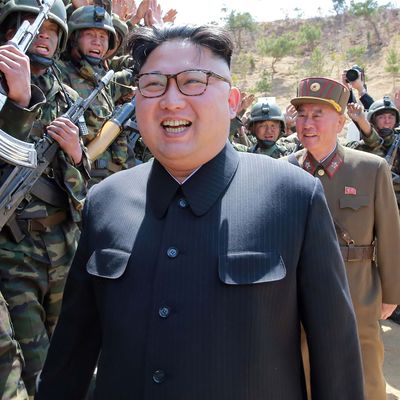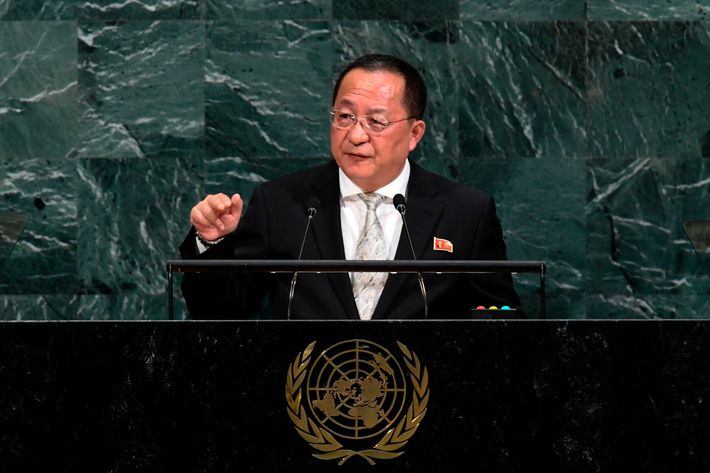
When President Trump threatened to “destroy” North Korea last week at the U.N., security experts from across the political spectrum didn’t even wait until he was done speaking to take to Twitter to criticize his remarks. From left-leaning academics to former George W. Bush White House staff, they said existential threats were likely to make Kim Jong-un more belligerent, not less.
Congratulations, experts — a bipartisan consensus nailed it again. Kim responded to Trump’s threat and his snark right away — turns out he didn’t seem to find the apparent Elton John reference in being called “Rocket Man” a compliment. He started with his own name-calling, labeling Trump a “dotard” — then added an allusive threat to test a nuclear weapon by loading one on a missile, lobbing it over Japan, and then detonating it above the Pacific Ocean. Doing so would end 37 years in which no country has tested nuclear weapons above ground. It would also have serious environmental repercussions — and if something went wrong on the launch pad or over Japanese territory, the toll could be much, much worse.
When the North didn’t immediately follow through on this threat last week, Americans’ attention followed Trump’s back to the NFL. But from North Korea’s perspective, the American provocations continued. Washington chose this weekend to fly fighter and bomber jets along the Korean coastline close to the Demilitarized Zone separating the two Koreas — closer to the border than U.S. jets have flown in at least 17 years. It will not have been lost on Pyongyang that the B1-B “Lancer” bombers in the mission are the largest and fastest in the U.S. fleet, carrying 75,000 pounds of bombs each. (They were long associated with carrying nuclear weapons, but had that capability removed as part of the START Treaty with Russia.)
It is against that backdrop that North Korea’s foreign minister Ri Yong-ho spoke to the press Monday, asserting that President Trump’s words at the U.N. amounted to a declaration of war, and thus the U.S. had declared war first, leaving North Korea the right of self-defense under the U.N. Charter. Specifically, Ri said, North Korea had the right to take countermeasures, such as shooting down U.S. strategic bombers, even if they have not crossed into North Korean territorial waters.

It may be surprising to hear that the “declaration of war” is the least concerning development here. Remember that the 1950s Korean War was settled with an armistice, not a permanent peace treaty. So from a legal perspective — and from Pyongyang’s point of view — the U.S. and North Korea are still and have always been at war.
Now, here’s the thing to worry about: When the North says it will shoot down U.S. aircraft, it is not kidding. The regime has done so before — forcing down a helicopter in 1994 and shooting down a plane in 1969, killing U.S. service members in each case.
Both times, American presidents wrestled with how to respond, considered using force, and declined to do so. A retired military pilot later told NPR that in the aftermath of the 1969 plane shoot-down that killed 31, Nixon and Kissinger actively considered a nuclear strike. Both times, the sitting American president had to deal with Pyongyang at a moment of great complexity and weakness in domestic U.S. politics. Both times, wider conflict was avoided.
But, as arms-control scholar Jeffrey Lewis notes, in the past, North Korea did this without the security of long-range missiles to frighten off a U.S. response. In the past, North Korea’s leaders were older men with more experience outside of the country’s borders. In the past, the American and North Korean heads of state didn’t trade insults in real time in front of millions on social media. And in the past, the president of the United States wasn’t Donald Trump.
In many ways, North Korea’s behavior is unnerving but consistent, over decades and between leaders. What determines whether we’re at war, it turns out, is less what North Korea does than how America responds to those actions. I’ll leave it up to you whether that realization is comforting or frightening.





























